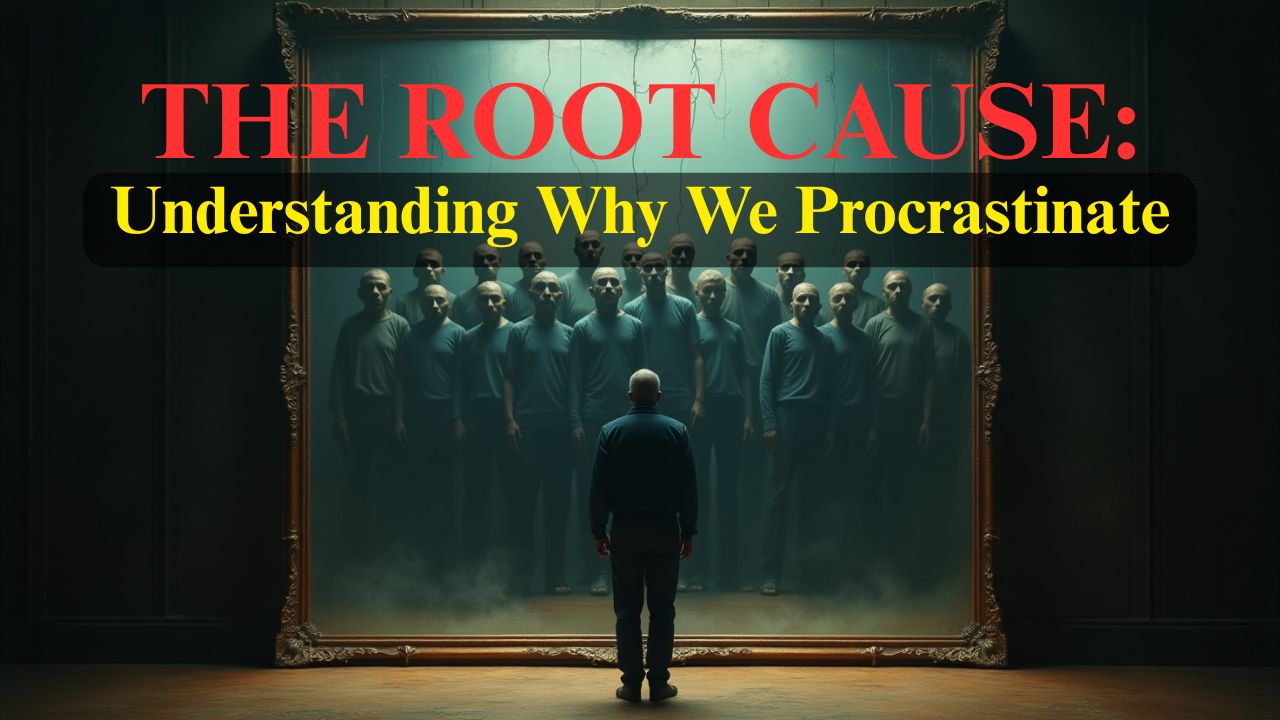The Root Causes: Understanding Why We Procrastinate
Having identified your procrastination patterns, you might be wondering: why do these patterns exist in the first place? Understanding the deeper psychological roots of procrastination is crucial because surface-level solutions rarely create lasting change. When we address the underlying causes, we can finally break free from the cycle of delay and avoidance.
The Fear-Based Foundation of Procrastination
At its core, most procrastination stems from fear. These fears often operate below our conscious awareness, making them particularly powerful in driving our behavior. The most common underlying fears include:
Fear of Failure
This is perhaps the most common root cause of procrastination. If you never fully try, you can always tell yourself (and others) that you could have succeeded if you had really applied yourself. Procrastination becomes a protective mechanism that preserves your sense of potential while avoiding the risk of discovering your limitations.
Fear of Success
Paradoxically, some people procrastinate because they're afraid of succeeding. Success can bring unwanted attention, increased expectations, more responsibility, or changes to relationships. Sometimes the familiar struggle feels safer than unknown success.
Fear of Judgment
The terror of being criticized, rejected, or found inadequate can be paralyzing. This fear often stems from early experiences of harsh criticism or perfectionist environments where mistakes were heavily penalized.
Fear of Imperfection
Perfectionism and procrastination are intimate partners. When your standards are impossibly high, any attempt feels doomed to fall short. It becomes easier to avoid trying than to face the reality of producing imperfect work.
Fear of Loss of Control
Some people procrastinate as a way to maintain a sense of control. By choosing when and how to do something (even if that choice is delay), they feel they're exercising autonomy in situations where they otherwise feel powerless.
Learned Helplessness and Procrastination
Sometimes procrastination develops from experiences of learned helplessness—repeated situations where your efforts didn't lead to desired outcomes. Over time, this can create a mindset of "why bother trying?" that manifests as chronic procrastination.
This often happens when:
- Past efforts were consistently criticized or dismissed
- You faced tasks that were genuinely beyond your developmental capacity
- Systems or environments were chaotic and unpredictable
- Rewards and punishments seemed arbitrary or unfair
The Role of Childhood Experiences
Many procrastination patterns have roots in childhood experiences:
Authoritarian Parenting
Children who grew up with overly controlling parents sometimes develop procrastination as a form of passive resistance. It becomes a way to assert independence and control.
Perfectionist Environments
Growing up in environments where mistakes weren't tolerated can create a lifelong fear of imperfection that manifests as procrastination.
Inconsistent Expectations
When expectations were unclear or constantly changing, children learned that it's safer to avoid action than risk getting it wrong.
Over-Scheduling
Children who were over-scheduled and never learned to self-regulate often struggle with procrastination as adults because they never developed internal motivation systems.
Rescue Patterns
If parents consistently rescued children from the consequences of procrastination, the child never learned to associate delay with real negative outcomes.
Cognitive Distortions That Fuel Procrastination
Our thinking patterns play a huge role in procrastination. Common cognitive distortions include:
All-or-Nothing Thinking: "If I can't do it perfectly, there's no point in doing it at all."
Catastrophizing: "If I fail at this, it will be a complete disaster and everyone will think I'm incompetent."
Mind Reading: "I know my boss will hate whatever I produce, so why bother trying?"
Fortune Telling: "I'm going to fail anyway, so there's no point in starting."
Emotional Reasoning: "I feel overwhelmed, so this task must be impossible."
Should Statements: "I should be able to do this easily" or "I shouldn't need help with this."
The Dopamine Connection
Procrastination also has a neurochemical component. Our brains are wired to seek immediate rewards (dopamine hits) over delayed gratification. Modern technology has exacerbated this tendency by providing instant sources of dopamine through social media, games, and entertainment.
When faced with a challenging task that won't provide immediate reward, our brains naturally gravitate toward activities that will give us that quick dopamine fix. Over time, this can rewire our neural pathways to prefer immediate gratification over long-term goals.
Attention and Executive Function Issues
For some people, procrastination is related to underlying attention difficulties or executive function challenges. This might include:
- Difficulty with working memory
- Problems with task initiation
- Challenges with time estimation
- Trouble prioritizing and organizing
- Difficulty sustaining attention on less stimulating tasks
If you suspect this might be a factor, consider consulting with a healthcare professional who can assess for conditions like ADHD.
The Secondary Gains of Procrastination
Sometimes we procrastinate because it serves us in ways we don't consciously recognize. These "secondary gains" might include:
- Getting others to lower their expectations of us
- Avoiding responsibilities we don't actually want
- Creating drama and excitement in our lives
- Getting attention and sympathy from others
- Maintaining a sense of rebellion or independence
- Avoiding the anxiety of having nothing urgent to do
Trauma and Procrastination
For some individuals, procrastination is connected to trauma responses. Trauma can affect our ability to plan for the future, regulate emotions, and feel safe taking action. If you suspect trauma might be influencing your procrastination, working with a qualified therapist can be extremely helpful.
Cultural and Social Influences
The culture we live in also shapes our relationship with procrastination:
- Cultures that emphasize individual achievement may create more performance anxiety
- Social media creates constant comparison opportunities
- The modern pace of life can feel overwhelming
- Information overload can lead to decision paralysis
- The gig economy and uncertain job markets increase anxiety about performance
The Shame Spiral
One of the most destructive aspects of chronic procrastination is the shame it generates. Shame tells us we're fundamentally flawed, which makes change feel impossible. This creates a vicious cycle:
Procrastination → Poor results → Shame → More procrastination
Breaking this cycle requires developing self-compassion and understanding that procrastination is a behavior, not an identity.
Questions for Self-Exploration
To understand your own root causes, consider these questions:
- What were you taught about mistakes and failure as a child?
- How did your family handle stress and difficult tasks?
- What are your earliest memories of procrastination?
- What fears come up when you think about completing important tasks?
- How do you typically cope with difficult emotions?
- What would happen if you succeeded beyond your current expectations?
- What beliefs do you hold about your own capabilities?
The Path Forward
Understanding your root causes isn't about dwelling in the past or making excuses. It's about developing compassion for yourself and recognizing that your procrastination patterns developed for reasons—they were attempts to protect yourself from real or perceived threats.
With this understanding, you can begin to address procrastination at its source rather than just managing symptoms. In our next article, we'll explore practical, evidence-based strategies for overcoming procrastination, building on the self-awareness you've developed.
Remember: your procrastination patterns developed over years and won't disappear overnight. But with patience, understanding, and the right strategies, they can be transformed.















